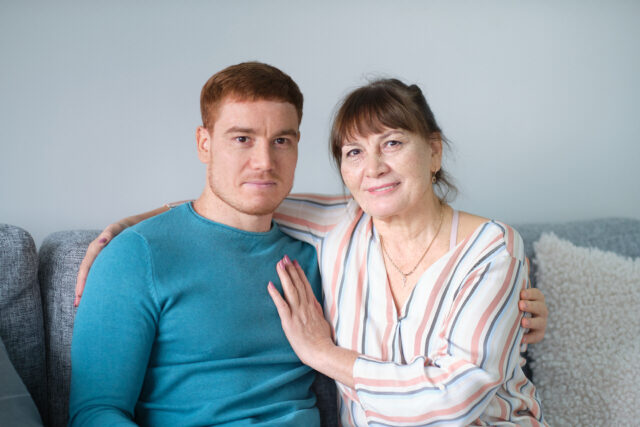You might not realise it (or want to admit it), but the way you are in relationships often echoes what you saw at home growing up.

Whether your parents had a stable, chaotic, distant, or affectionate dynamic, it leaves a mark and changes how you see love and partnership. These behaviours tend to slip into our romantic lives without us even noticing, and they can be surprisingly hard to spot until something starts to feel off. Here are some of the most common relationship habits you might have picked up from your parents, and that you might need to unlearn if you want to enjoy happy, healthy relationships.
1. Avoiding conflict at all costs

If you grew up in a house where arguments were explosive (or completely shut down), you might now associate conflict with danger, not growth. So instead of speaking up, you bite your tongue, even when something really bothers you. This leads to resentment building slowly in the background. You might think you’re keeping the peace, but in reality, you’re avoiding the kind of honesty that deep connection actually requires.
2. Over-explaining your feelings to justify having them

If your emotional needs were met with scepticism or shutdowns growing up, you may have learned to over-explain everything just to feel heard. You don’t just say, “That hurt me”—you launch into five reasons why it was valid to be hurt. This often comes from a place of needing emotional permission. Instead of trusting your own feelings, you seek validation to make them seem “acceptable” to your partner.
3. Expecting your partner to read your mind

Maybe you had caregivers who expected you to just “know” what they needed without ever saying it out loud. That can morph into the adult belief that love should be intuitive, not communicated. So now, you find yourself feeling let down when your partner doesn’t pick up on your unspoken signals, even though you never actually voiced them. It’s not manipulative, it’s learned silence.
4. Mistaking emotional distance for independence

If your parents were emotionally unavailable or kept feelings tightly under wraps, you might’ve picked up the message that being strong means being distant. As a result, closeness can feel uncomfortable or even suspicious. You might find yourself pulling away just when things start to deepen—not because you don’t care, but because you’re wired to associate intimacy with discomfort.
5. Playing the fixer, even when no one asked

Growing up around emotionally unpredictable adults often turns kids into caretakers. If you were the one trying to smooth things over or keep people happy, that role can follow you into adulthood. Now in your relationships, you might feel responsible for your partner’s moods, choices, or healing journey, even if it’s draining you. Being supportive is one thing. Taking on the entire emotional load is another.
6. Equating love with proving yourself

If love was conditional in your household—based on grades, behaviour, or how little trouble you caused—you might now feel like you need to earn love through constant effort. This shows up as perfectionism, people-pleasing, or always needing to “bring something to the table” in order to feel worthy of being chosen.
7. Feeling uneasy in calm, stable relationships

For people raised around chaos or inconsistency, stability can feel suspicious. If things aren’t intense, dramatic, or emotionally charged, your nervous system might read it as boring or emotionally distant. This often leads to self-sabotaging healthy dynamics or misinterpreting calmness as a lack of passion, when in reality, it’s the kind of safety you were never given.
8. Needing control to feel secure

If your childhood environment felt unpredictable, you may have learned to manage your surroundings—and people—as a way to feel safe. That habit can follow you into romantic relationships, even when there’s no real threat. This might look like micromanaging plans, needing constant reassurance, or getting anxious when things don’t go “your way.” It’s not about dominance. It’s about soothing old fears of instability.
9. Repeating the same emotional roles

If one parent was always the caretaker and the other leaned back, or one was always chasing while the other withdrew, you might unconsciously adopt one of those roles in your own relationships. This repetition feels familiar, but it often leads to imbalance. Until you notice it, you’ll keep replaying the same emotional dynamics over and over with different faces.
10. Struggling to receive affection without earning it

For those who weren’t consistently nurtured, affection can come with strings. You might feel uncomfortable when someone is just nice to you “for no reason.” There’s a part of you waiting for the catch. This can make vulnerability difficult. You’re more comfortable being the giver than the receiver—because receiving feels undeserved, or worse, unsafe.
11. Using humour or sarcasm to deflect emotions

If emotional conversations were rare or awkward growing up, humour might have become your safest way to express yourself. It keeps things light, non-threatening, and distant enough not to sting. Of course, in relationships, this deflection can make your partner feel like they’re never quite getting the real you. Sometimes, the joke is a shield, and it gets in the way of being seen.
12. Feeling responsible for your partner’s emotional state

If you were made to feel like your moods affected your parents’ well-being—or if you were blamed for their unhappiness—you may now carry that burden into relationships. This looks like hypervigilance around your partner’s emotions, tiptoeing to avoid upsetting them, or feeling like it’s your job to keep the peace, no matter what it costs you.
13. Believing love should feel like hard work

If relationships around you growing up looked exhausting, full of sacrifice or survival, you may equate emotional labour with love. The harder it feels, the more real it must be. This belief makes healthy relationships feel suspiciously easy—or worse, unearned. But love doesn’t always have to hurt to mean something. Peace can be just as meaningful as passion.
14. Over-identifying with being “the strong one”

If your household didn’t allow space for softness or emotion, you might now pride yourself on being the strong one—the one who never breaks, never complains, always keeps it together. While strength is admirable, always being “fine” can isolate you. It keeps other people at arm’s length and blocks the kind of support and connection you actually need.
15. Feeling guilty when setting boundaries

If you were raised to prioritise other people’s comfort over your own, boundaries can feel selfish or even dangerous. You may have learned that saying no leads to conflict or rejection. This guilt can keep you stuck in relationships where your needs go unmet. But boundaries aren’t about pushing people away—they’re about protecting the version of you that deserves to stay whole.




